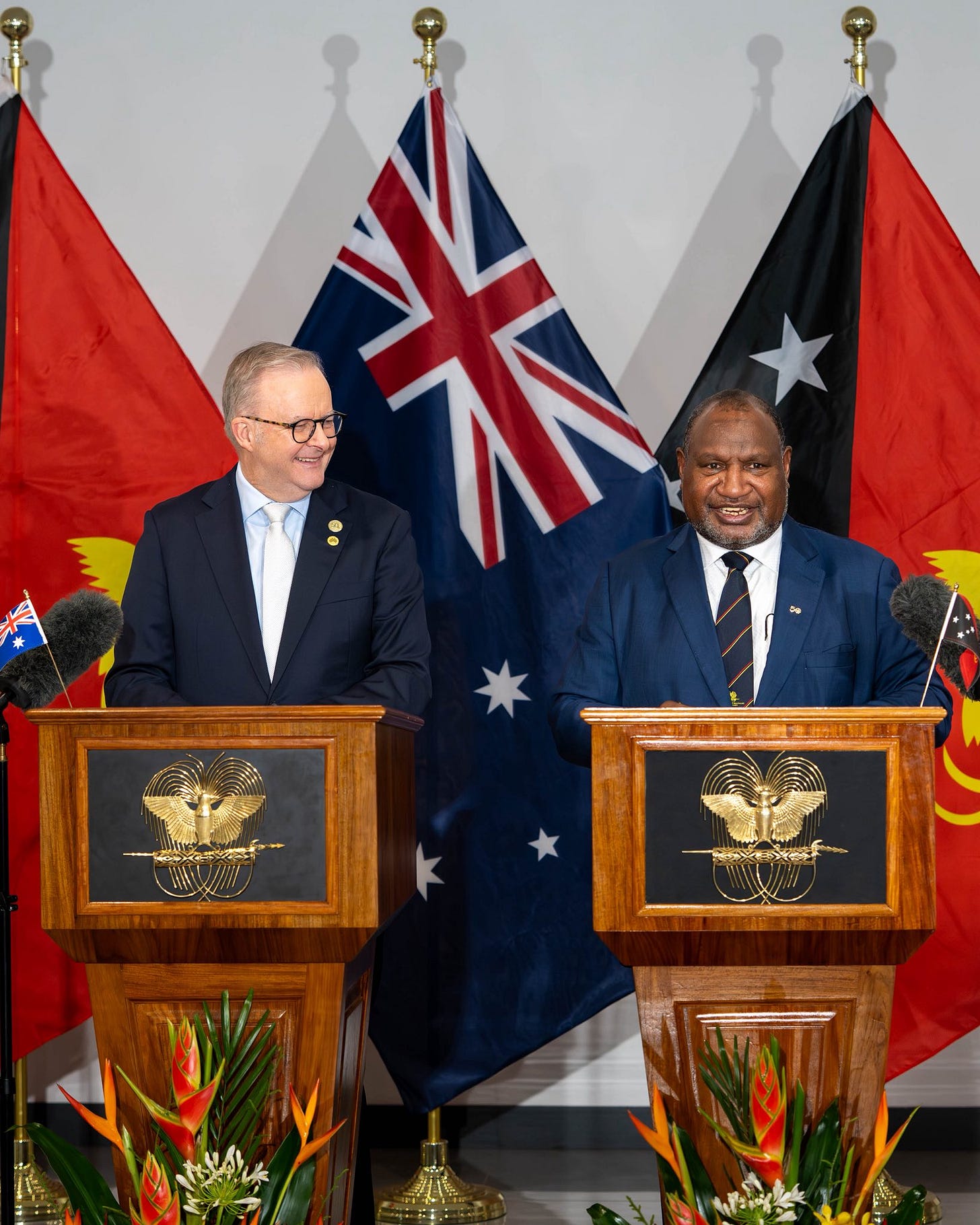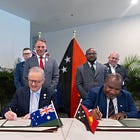Australia-PNG Defense Treaty Marks Historic Shift in Pacific Security, Expert Says Recruitment Crisis Key Driver
This piece is freely available to read. Become a paid subscriber today and help keep Mencari News financially afloat so that we can continue to pay our writers for their insight and expertise.
Today’s Article is brought to you by Empower your podcasting vision with a suite of creative solutions at your fingertips.
Australia’s newly approved defense treaty with Papua New Guinea represents a natural progression in the bilateral relationship accelerated by geopolitical circumstances and Canberra’s urgent need to address a recruitment crisis in the Australian Defence Force, according to a leading Pacific security expert.
Oliver Nobetau, project director of the Australia Papua New Guinea Network at the Lowy Institute, told ABC News the agreement’s significance lies not in dramatic policy shifts but in formalizing arrangements that reflect evolving security realities in the region.
“I don’t think that much has changed after the initial communique was signed,” Nobetau said in a Thursday interview. “I think what we saw that there was some concerns being raised, especially on the PNG side or on questions of sovereignty and how this will affect the relationship with China. But both governments have been quite adamant that this is a major win for both sides.”
The treaty, approved by PNG’s cabinet Thursday after procedural delays during Prime Minister Anthony Albanese’s September visit, will allow direct recruitment of Papua New Guinean citizens into the Australian Defence Force to help address personnel shortfalls.
“If we’re looking at the broader picture for Australia I think Australia’s been facing a bit of a recruitment crisis as well within the ADF and the biggest one of the key elements that’s making headlines is the direct recruitment of Papua New Guinean citizens into the Australian Defence Force now to assist with that sort of recruitment shortfall,” Nobetau said.
Truth matters. Quality journalism costs.
Your subscription to Mencari directly funds the investigative reporting our democracy needs. For less than a coffee per week, you enable our journalists to uncover stories that powerful interests would rather keep hidden. There is no corporate influence involved. No compromises. Just honest journalism when we need it most.
Not ready to be paid subscribe, but appreciate the newsletter ? Grab us a beer or snag the exclusive ad spot at the top of next week's newsletter.
The arrangement creates what Nobetau described as a significant economic opportunity for PNG citizens while addressing a critical capability gap acknowledged by PNG Prime Minister James Marape himself.
“James Marape, during the signing of the communique, during the press statement that was said, he said, quite frankly, that the PNG Defence Force doesn’t have the capability to protect PNG from any sort of territorial incursions,” Nobetau said. “And with this partnership with Australia, this enhanced partnership through the treaty, we can have greater capability partnerships and resource sharing as well, which will assist the PNG Defence Force to carry out its objectives.”
The treaty text remains under wraps despite the cabinet approval, with Nobetau noting limited public information about specific provisions.
“The treaty itself has been quite it’s been kept under wraps and I think because of really the significance of the treaty,” he said.
What is known centers on several key elements beyond recruitment. The agreement frames the relationship as a defense alliance, a designation that raised concerns about how two countries with vastly different security threat perceptions would align their strategic priorities.
“The framing of the wording around a defense alliance which has been something that was concerning for a lot of parties on how are they going to marry the asymmetry of security threats and threat perceptions while australia sees china as its biggest security threat png says that its biggest security threat is more internal, so how they marry those,” Nobetau said.
The treaty also addresses increased interoperability between defense forces that already maintain close operational relationships and includes provisions for respecting each nation’s sovereignty.
“There’s already a high degree of interoperability between both of the forces,” Nobetau said. “And I think the other one as well that came out in the communique was how to respect sovereignty of each other’s nations.”
China’s reaction to the pending agreement caught both Australian and PNG officials off guard, according to Nobetau. The Chinese embassy in Port Moresby released a Facebook statement urging PNG not to proceed with arrangements that would unfairly affect third-party interests.
“I think that was a shock, I think, not only for Australia, but also for PNG as well, right?” Nobetau said. “The Chinese embassy released a statement on Facebook saying that it should not prevent or sort of unfairly or unjustly affect third-party interests.”
Nobetau suggested China’s objection to what he characterized as a purely military treaty revealed underlying concerns about Beijing’s own defense intentions in the region.
“The biggest question that raised out of that was that this is a purely military treaty,” he said. “So if there are concerns around China on third parties being excluded, then I think it speaks to maybe an underlying defence intention or military intentions by China as well.”
Public reaction within Papua New Guinea has reflected a range of concerns, particularly around sovereignty and the future of PNG-China relations.
“It’s been a bit of a mixed bag,” Nobetau said. “I think as expected, there were some comments that were being made, and rightly so, I think they’re valid concerns. The two things that you hear most about from the PNG public is one, concerns around sovereignty and the other as well as on how this will affect the relationship with China.”
Marape has attempted to address those concerns by demarcating distinct spheres for different international relationships.
“The Papua New Guinea government, especially James Amarape, has come out and sort of demarcated how they see the bilateral relationships moving forward now within the security space, siding with Australia’s traditional Western allies, and definitely in the economic and trade space, building up that relationship with China,” Nobetau said.
The sovereignty question carries particular weight given Australia’s history as PNG’s colonial administrator until independence in 1975.
“This is something that Papua New Guineans themselves are quite concerned about,” Nobetau said. “It’s no tricky, it’s a big hurdle for, I think, Australia to overcome. Australia has obviously the history with PNG as its colonial administrator, and the questions are being asked, is this a return to sort of neo-colonialism now?”
Nobetau rejected the neo-colonialism framing, arguing both countries are entering the arrangement as equals.
“I don’t think that’s the case,” he said. “I think both of the parties are entering into this in equal footing as partners in the Pacific to try and contribute back to regional stability.”
The path forward involves signing the treaty following cabinet endorsement, then beginning ratification processes in both countries.
“After the Cabinet endorsement, we will see signing and the ratification process will take place,” Nobetau said. “For PNG, what this looks like is a debate on Parliament, and we will be seeing how well they address these issues.”
The September delay when Albanese visited PNG appeared procedural rather than political, according to Nobetau.
“With the PNG delay, it seemed to be more of a procedural issue, and I think we can be comfortable in saying that it was, right?” he said. “James Maripa just returned from what I stand yesterday from UNGA, same with Albanese and this seems to be the first agenda item on the list now.”
Nobetau drew a contrast with another Pacific security agreement that has stalled. The Nakamal Agreement with Vanuatu, which also faced delays during an Albanese visit, appears to be losing momentum.
“The Nakamal agreement however there is not there are no winds sort of picking up on that as well so it seems to be that this one is slowly falling off the agenda list,” Nobetau said.
The PNG treaty’s cabinet approval comes as Australia intensifies diplomatic engagement across the Pacific following China’s 2022 security agreement with Solomon Islands, which alarmed Canberra and prompted accelerated efforts to strengthen traditional partnerships in the region.
For Australia, the treaty addresses multiple strategic objectives beyond the immediate recruitment benefits. It formalizes a defense relationship with its nearest neighbor, creates a framework for enhanced military cooperation, and signals commitment to Pacific security partnerships at a time of increasing regional competition.
For Papua New Guinea, the agreement provides security guarantees from a developed military power, creates employment and training opportunities for citizens, and potentially opens access to advanced defense equipment and intelligence capabilities the PNG Defence Force currently lacks.
The economic dimension of PNG citizens joining the ADF could prove significant for a developing nation where employment opportunities, particularly in skilled sectors, remain limited.
“It provides a really significant economic opportunity for Papua New Guinean citizens to come and join the ADF,” Nobetau said.
The treaty makes PNG only Australia’s third formal military ally alongside the United States and New Zealand, elevating the relationship to a level not seen with any other Pacific nation. This alliance status carries symbolic weight beyond operational military cooperation, positioning PNG as a core strategic partner for Australia.
The recruitment provisions represent an innovative approach to addressing defense force personnel challenges while creating pathways for Pacific citizens into Australian military careers. Details about recruitment numbers, training programs, and service requirements have not been publicly disclosed.
How PNG’s parliament debates sovereignty concerns during ratification will test public acceptance of the agreement and could influence Australia’s approach to similar arrangements with other Pacific nations. The parliamentary process will provide the first comprehensive public airing of the treaty’s terms and implications.
Nobetau’s assessment that the treaty represents a natural progression suggests the formal alliance codifies security cooperation that has deepened informally over recent years as both countries navigate an increasingly complex regional security environment.
The timing of the cabinet approval, coming shortly after both Marape and Albanese returned from the United Nations General Assembly in New York, positions the signing for completion in coming weeks pending resolution of scheduling conflicts around Albanese’s meeting with U.S. President Donald Trump.
Whether the treaty model influences other Pacific nations’ approach to security partnerships with Australia remains uncertain, but the PNG agreement establishes a template for formalized alliance relationships that could reshape regional security architecture in the years ahead.
Sustaining Mencari Requires Your Support
Independent journalism costs money. Help us continue delivering in-depth investigations and unfiltered commentary on the world's real stories. Your financial contribution enables thorough investigative work and thoughtful analysis, all supported by a dedicated community committed to accuracy and transparency.
Subscribe today to unlock our full archive of investigative reporting and fearless analysis. Subscribing to independent media outlets represents more than just information consumption—it embodies a commitment to factual reporting.
As well as knowing you’re keeping Mencari (Australia) alive, you’ll also get:
Get breaking news AS IT HAPPENS - Gain instant access to our real-time coverage and analysis when major stories break, keeping you ahead of the curve
Unlock our COMPLETE content library - Enjoy unlimited access to every newsletter, podcast episode, and exclusive archive—all seamlessly available in your favorite podcast apps.
Join the conversation that matters - Be part of our vibrant community with full commenting privileges on all content, directly supporting The Evening Post (Australia)
Catch up on some of Mencari’s recent stories:
It only takes a minute to help us investigate fearlessly and expose lies and wrongdoing to hold power accountable. Thanks!








